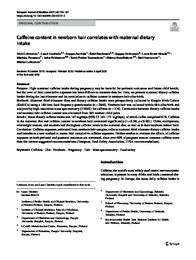Caffeine content in newborn hair correlates with maternal dietary intake

Files
Self archived version
published versionDate
2021Author(s)
Unique identifier
10.1007/s00394-020-02231-2Metadata
Show full item recordMore information
Self-archived item
Citation
Lehtonen, Anni. Uusitalo, Lauri. Auriola, Seppo. Backman, Katri. Heinonen, Seppo. Keski-Nisula, Leea. Pasanen, Markku. Pekkanen, Juha. Tuomainen, Tomi-Pekka. Voutilainen, Raimo. Hantunen, Sari. Lehtonen, Marko. (2021). Caffeine content in newborn hair correlates with maternal dietary intake. European journal of nutrition, 60, 193-201. 10.1007/s00394-020-02231-2.Rights
Abstract
Purpose
High-maternal caffeine intake during pregnancy may be harmful for perinatal outcomes and future child health, but the level of fetal cumulative exposure has been difficult to measure thus far. Here, we present maternal dietary caffeine intake during the last trimester and its correlation to caffeine content in newborn hair after birth.
Methods
Maternal third trimester diets and dietary caffeine intake were prospectively collected in Kuopio Birth Cohort (KuBiCo) using a 160-item food frequency questionnaire (n = 2840). Newborn hair was collected within 48 h after birth and analyzed by high-resolution mass spectrometry (HRMS) for caffeine (n = 316). Correlation between dietary caffeine intake and neonatal hair caffeine content was evaluated from 203 mother–child pairs.
Results
Mean dietary caffeine intake was 167 mg/days (95% CI 162–172 mg/days), of which coffee comprised 81%. Caffeine in the maternal diet and caffeine content in newborn hair correlated significantly (r = 0.50; p < 0.001). Older, multiparous, overweight women, and smokers had the highest caffeine levels in the maternal diet, as well as in their newborn babies’ hair.
Conclusion
Caffeine exposure, estimated from newborn hair samples, reflects maternal third trimester dietary caffeine intake and introduces a new method to assess fetal cumulative caffeine exposure. Further studies to evaluate the effects of caffeine exposure on both perinatal and postnatal outcomes are warranted, since over 40% of pregnant women consume caffeine more than the current suggested recommendations (European Food Safety Association, EFSA recommendations).
Keywords
Link to the original item
http://dx.doi.org/10.1007/s00394-020-02231-2Publisher
Springer Science and Business Media LLCCollections
- Terveystieteiden tiedekunta [1793]


